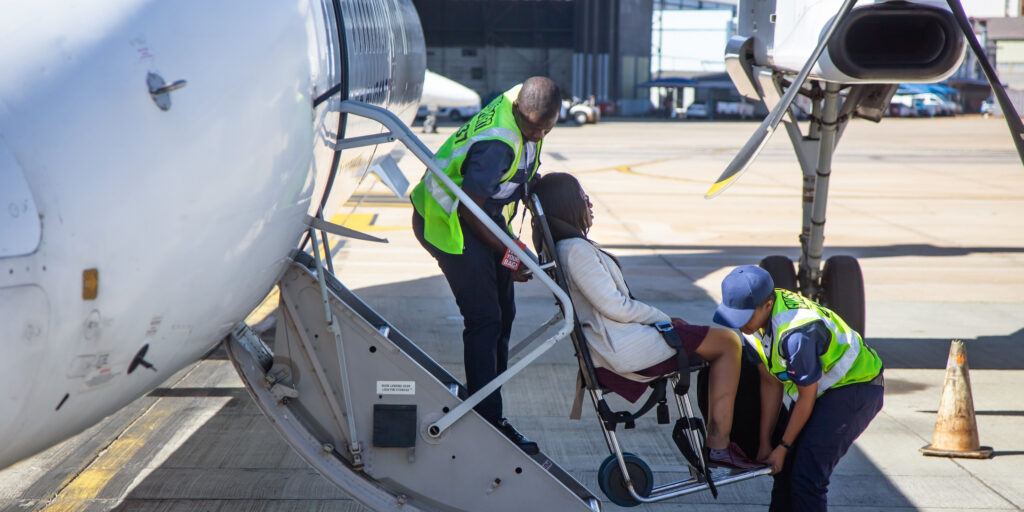
Everything You Need to Know About the DOT Ruling on Accessible Air Travel
By Mark Fisher | Tuesday, January 21, 2025
At the end of 2024, the Department of Transportation (DOT) released a final rule aimed at improving the air travel experience of wheelchair users. This rule enacted major changes that should make the experience on aircrafts better for those living with a disability.
But what does it mean for you?
We sat down with Shannon Wood and Mark Fisher from MDA’s Advocacy Team to chat through this monumental action by the Department of Transportation.
How monumental is this DOT rule and when does it take effect?
This new rule is huge and was a multi-year effort from MDA and its advocates. MDA advocates sent over 400 comments to the DOT, and many testified at Department listening sessions. We’re thrilled that these regulations are now final.
Many of the items in the rule went into effect January 16, 2025, but there are some that have longer deadlines for implementation.
I thought airlines were already required to provide people living with disabilities safe and dignified assistance. What has changed?

Mark Fisher, MDA Director of Advocacy Engagement
Yes, but for the first time, “safe” and “dignified” are now defined, which should lead to greater accountability from airlines.
We know passengers with disabilities face unsafe situations, such as being dropped by airline staff during transfer or experiencing bodily harm caused by broken or damaged wheelchairs. According to this rule, actions that result in a “heightened risk of bodily injury, which may include loss or damage to wheelchairs and other assistive devices that result in bodily injury” violate the rights of passengers with disabilities.
In addition, we’ve heard undignified stories of clothing being removed during transfers or passengers soiling themselves due to delays in restroom access. DOT clearly states in the final rule that any actions that do not “respect a passenger’s independence, autonomy, and privacy” are strictly prohibited.
What will the experience boarding and deplaning an aircraft be under this new rule?
Under this new rule, it is required that airline’s assistance in boarding, deplaning, and connecting (such as to a different terminal) – which was already required by law – must be given in a prompt manner. For those living with a disability, this could look different depending on your circumstance. But examples include:
- The ability to pre-board before other passengers.
- Personnel and boarding chairs must be ready to assist passengers no later than as soon as other passengers have left the aircraft. Waiting for this assistance long after passengers have deplaned is not allowed.
- Equipment to navigate the airport, such as motorized wheelchairs or scooters, must also be made available in a prompt manner.
What if I need to check my wheelchair? What should I know?
Before even arriving to the airport, airlines must now post the dimensions of aircraft cargo holds, including cargo entries, on their websites. This will ensure passengers will know if their wheelchair fits inside the plane before they arrive at the airport.
In addition, by December 17, 2025, when a passenger checks their wheelchair with an airline, the airline must:
- Notify passengers of their rights, including the right to file a claim if the wheelchair is mishandled or damaged.
- Notify the passenger when the wheelchair or device is loaded onto the aircraft and unloaded off the aircraft.
- Notify the passenger if the size, weight, or another attribute prevented the carrier from loading the wheelchair or scooter.
What is being done to prevent a wheelchair from being damaged? Will airline workers receive any training?
New requirements have been placed on airlines following wheelchair mishandlings. Under this new rule, wheelchairs and other assistive devices checked with the airline, will fall under the same mishandling rules airlines face with baggage. Though airlines will still be able to dispute any claims of mishandling wheelchairs, they can no longer claim “acts of God” or “damage because of a third party”. The Department adopted a ‘prompt’ standard for repair and replacement of damaged wheelchairs, stating that airlines should remain active and responsive to the maximum extent possible once the repair or replacement process has been initiated.
In addition, airline workers and contractors must go through enhanced training on specific topics, such as:
- Wheelchair disassembly and reassembly
- Proper loading and securement
- Safe and dignified transfer assistance
- Proper use of airline equipment
Workers must demonstrate knowledge on these training topics and receive refresher training every 12 months, expanding existing requirements for employees and contractors to be trained ‘to proficiency’. This new training requirement will take effect on June 17, 2026.
What happens if my wheelchair is damaged?
If the airline damages a wheelchair, the airline must notify the passenger in writing of their rights, including:
- The right to file a claim with the airline.
- The right to receive a loaner wheelchair that best meets their physical and functional needs. If a loaner chair is not available that meets the passenger’s needs, the airline must reimburse the passenger if they find an alternative that works for them.
- The ability for the passenger to choose a preferred vendor for repair or replacement. The passenger may also have the airline seek out a vendor to repair the wheelchair. The airline will bear the costs of the repair or replacement.
- The right to have a Complaints Resolution Officer available.
Many of these regulations will take effect on March 17, 2025.
What if my wheelchair is delayed in being returned to me after my flight?
If the airline is delayed in returning a wheelchair, they must transport the wheelchair to you within 24 hours at their expense. They also must reimburse the passenger for travel costs if the passenger elects to pick up the delayed wheelchair themselves. This part of the rule goes into effect by the summer of 2025.
In addition, by December 17, 2025, airlines must provide safe and adequate seating accommodations for people with disabilities who are waiting for delayed wheelchairs or loaners at the airport. Airlines are required to work with disability rights organizations to determine seating options that work for most people with disabilities.
What if I need to rebook my flight because the wheelchair does not fit in the cargo hold?

Shannon Wood, MDA Director of Disability Policy
Even if people check to ensure their wheelchair can fit in the cargo hold when booking a ticket, there’s always a chance something could go wrong when they show up at the airport. For example, the airplane type could change last minute and the new cargo hold might be smaller. This could result in the passenger needing to book another flight, even if it’s more expensive.
The final rule adopted by the Department requires airlines to reimburse a passenger who uses a wheelchair or scooter the difference between the fare on a flight taken and the fare on a flight they would have taken if their wheelchair had fit. Note: This is limited to flights on the same day, on the same airline, and between the same origin and destination. In addition, this portion of the rule goes into effect on March 17, 2025.
I want to learn even more about these changes, where can I go?
MDA has a full analysis of these rule changes, including the exact implementation dates of each provision and MDA’s work to shape these final regulations. You can find that document here.
Next Steps and Useful Resources
- Gain access to a full analysis of these rule changes, including the exact implementation dates of each provision and MDA’s work to shape these final regulations here.
- To connect with the MDA Advocacy Team and become an advocate, join our Action Network: https://www.votervoice.net/MDA/home
- Read more about MDA efforts towards accessible air travel here.
- Learn more about the FAA Reauthorization bill here.
- Watch the MDA Advocacy Institute: The Administration’s Major Air Travel Proposal to learn more about the DOT’s proposal for accessible air travel.
- Stay up-to-date on Quest content! Subscribe to Quest Magazine and Newsletter.
TAGS: Accessible Air Travel, Advocacy Updates
TYPE: Blog Post
Disclaimer: No content on this site should ever be used as a substitute for direct medical advice from your doctor or other qualified clinician.




